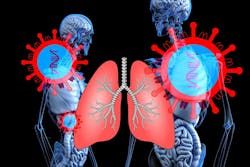To expedite care for hospitalized COVID-19 patients, a team at the Feinstein Institutes for Medical Research has developed a machine learning (ML) artificial intelligence (AI) powered clinical predictive tool that can assess patients for the risk of respiratory failure within 48 hours, according to a news release from the institute, which is part of Northwell Health.
The research was published in the Journal of Medical Internet Research.
Scientists collected and analyzed electronic health record (EHR) data from 11,525 patients who were admitted across 13 Northwell Health hospitals between March 1-May 11, 2020. Of those patients, 8 percent (933 patients) were placed on invasive mechanic ventilation within 48 hours of admission.
Using that data to aid clinicians in predicting which patients may be at risk of respiratory, the team created and compared three ML tools to help score patients upon admission. One of the tools, gradient boosted decision trees — commonly known as XGBoost — had the highest average predictive accuracy at 92 percent.
To develop the ML clinical models, scientists used measurements commonly recorded in the emergency department, such as vitals and labs, along with demographics. The model performance was compared against and outperformed the Modified Early Warning Score (MEWS) — a ranking that assesses health risk factors — to calculate the chance of respiratory failure within 48 hours of hospital admission.
The models proved accurate in the ability to identify at-risk patients for earlier interventions, including closer patient monitoring, critical care consultation and earlier discussions about goals of care that could ultimately improve patient outcomes. The research team plans to implement the clinical tool within some Northwell Health hospitals.




